Simplify the Process with 25 Ready-to-Use Immigration Reference Letter Templates
Welcome to “Immigration Reference Letters,” your comprehensive resource for all your immigration letter-writing needs. We understand the significance of well-crafted reference letters in supporting your immigration applications. Our website is dedicated to providing you with the guidance, tools, and information necessary to create compelling reference letters tailored to your specific immigration category. Whether you are seeking employment-based immigration, family-based sponsorship, entrepreneurship opportunities, or humanitarian protection, we have you covered. From sample letters to practical writing tips, ethical considerations, and an understanding of various immigration requirements, our resources will empower you to showcase your qualifications, skills, and personal circumstances effectively. With our expertise and support, you can navigate the letter-writing process with confidence, ensuring that your reference letters accurately portray your strengths and enhance your eligibility for immigration.
Tips for Writing Reference Letters
- Structure:
- Begin with a professional salutation and introduction.
- Clearly state your relationship to the applicant and your qualifications to write the reference letter.
- Use paragraphs to organize different points or aspects of the applicant’s qualifications.
- Conclude with a summary of the applicant’s strengths and a closing statement.
- Tone:
- Maintain a formal and professional tone throughout the letter.
- Write with confidence and authority, highlighting the applicant’s qualifications and achievements.
- Avoid using overly personal or informal language.
- Relevant Content:
- Provide specific examples and details to support your statements about the applicant’s qualifications.
- Focus on the applicant’s relevant skills, experiences, and achievements related to their immigration application.
- Highlight the applicant’s unique qualities, such as leadership abilities, problem-solving skills, or cultural adaptability.
- Key Qualifications or Characteristics:
- Identify the key qualifications or characteristics that make the applicant well-suited for immigration.
- Emphasize the applicant’s expertise, academic achievements, professional accomplishments, or contributions to the community.
- Discuss any exceptional qualities that set the applicant apart from others.
- Proofread and Edit:
- Review the letter for grammar, spelling, and punctuation errors.
- Ensure the letter flows smoothly and is easy to read.
- Edit the content to make it concise, focusing on the most relevant and impactful information.
- Professionalism:
- Maintain a neutral and unbiased perspective.
- Avoid including personal biases or subjective opinions.
- Stick to the facts and provide a balanced assessment of the applicant’s qualifications.
Ethical Considerations:
Writing immigration reference letters carries a significant responsibility, as these letters can greatly influence an individual’s immigration application. It is essential to adhere to ethical writing practices to ensure the integrity and credibility of the reference letter. Here are some key ethical considerations to keep in mind:
- Honesty: It is crucial to be truthful and provide an accurate portrayal of the individual’s qualifications, skills, and character. Exaggerating or misrepresenting information can undermine the credibility of the letter and harm the applicant’s chances of a successful immigration outcome.
- Accuracy: Take the time to gather and verify accurate information about the individual’s achievements, experiences, and contributions. Double-check dates, positions held, and other relevant details to ensure the letter reflects a true and reliable account of the applicant’s background.
- Professionalism: Maintain a professional tone and approach when writing the reference letter. Focus on the applicant’s professional qualifications, skills, and achievements relevant to the immigration application. Avoid including personal biases, irrelevant information, or any content that may compromise the integrity of the letter.
- Confidentiality: Respect the privacy and confidentiality of the applicant. Ensure that sensitive personal or confidential information is not shared without proper consent. Exercise discretion and only include information that is relevant and necessary to support the immigration application.
- Avoid Conflicts of Interest: Disclose any potential conflicts of interest or personal relationships that may compromise the objectivity of the reference letter. It is important to provide an unbiased assessment of the applicant’s qualifications and abilities.
#1: Employment Immigration
An Employment Immigration Reference Letter serves as a testimonial of an individual’s skills, qualifications, and work experience, provided by a current or former employer. The letter highlights the applicant’s job responsibilities, professional achievements, and ability to contribute positively to the workforce. It also provides insights into the applicant’s character, work ethic, and compatibility with the work environment. The Employment Immigration Reference Letter plays a vital role in supporting the applicant’s immigration case by providing credible evidence of their skills and employment history, thereby enhancing their chances of securing work-related immigration approval.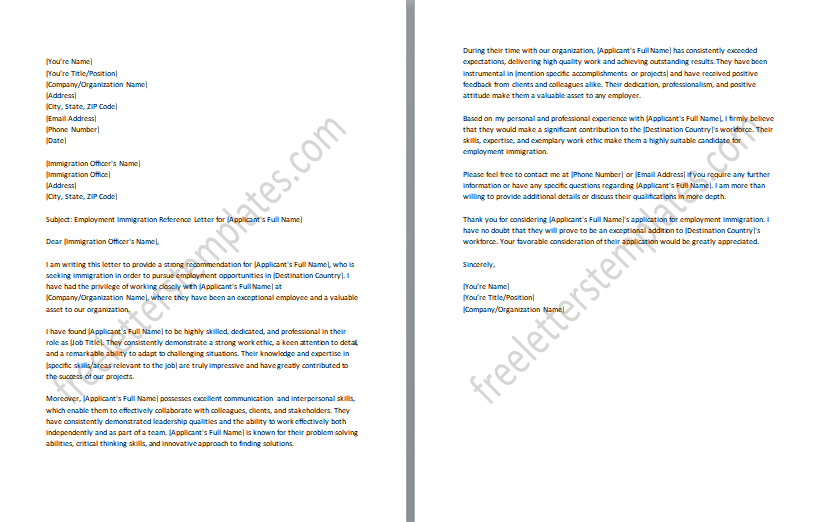
#2: Academic Immigration
An Academic Immigration Reference Letter is a document that provides an assessment of an individual’s academic achievements, abilities, and potential, typically written by a professor, mentor, or academic supervisor. This letter serves as a critical component of an immigration application for individuals seeking to pursue academic opportunities in a foreign country. The letter highlights the applicant’s educational background, academic performance, research contributions, and potential for future academic success. It also emphasizes the applicant’s intellectual curiosity, critical thinking abilities, and commitment to scholarly pursuits. The Academic Immigration Reference Letter plays a crucial role in supporting the applicant’s immigration case by providing evidence of their academic qualifications and their ability to make valuable contributions to the academic community in the destination country.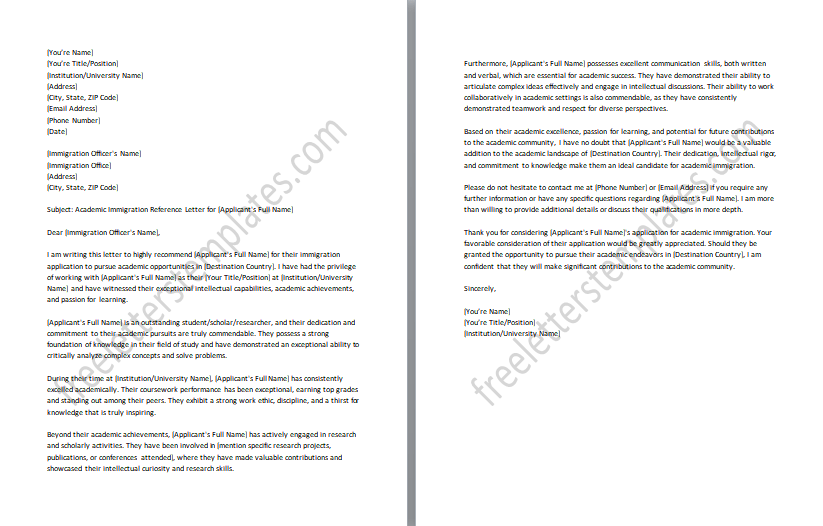
#3: Business Immigration
A Business Immigration Reference Letter is a document that validates an individual’s business experience, achievements, and professional qualifications. Typically provided by a business partner, supervisor, or client, this letter plays a significant role in supporting an immigration application for individuals seeking to engage in business activities or establish a business in a foreign country. The letter highlights the applicant’s entrepreneurial skills, management expertise, industry knowledge, and track record of success in business ventures. The Business Immigration Reference Letter serves as a crucial endorsement of the applicant’s business acumen and suitability for engaging in business activities in the destination country, reinforcing their credibility and increasing their chances of obtaining the desired immigration status.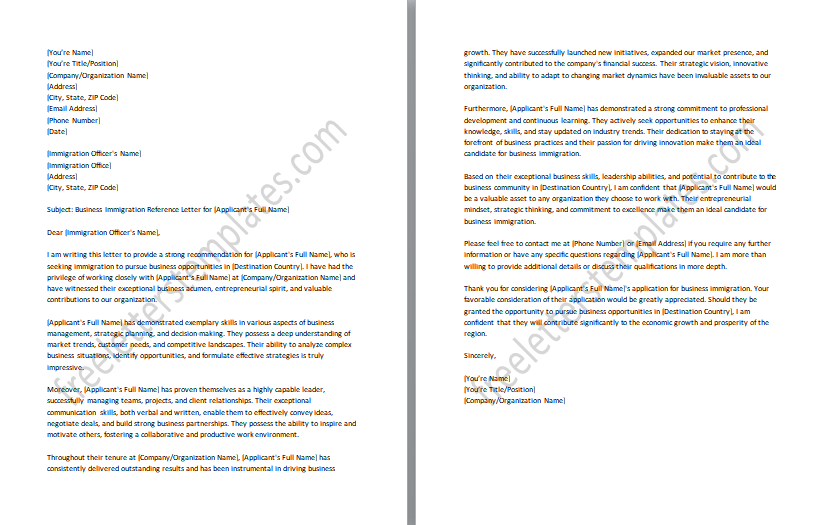
#4: Family Immigration
A Family Immigration Reference Letter is a heartfelt and personal document that supports an individual’s immigration application on the basis of family reunification. Written by a family member, relative, or close friend, this letter highlights the relationship between the applicant and the sponsor, emphasizing their emotional bond, shared experiences, and mutual support. The letter addresses the importance of family unity, expressing the sponsor’s desire to have their loved one join them in the destination country. It highlights the sponsor’s ability to provide financial, emotional, and social support to the applicant, ensuring a smooth transition and successful integration into the new community.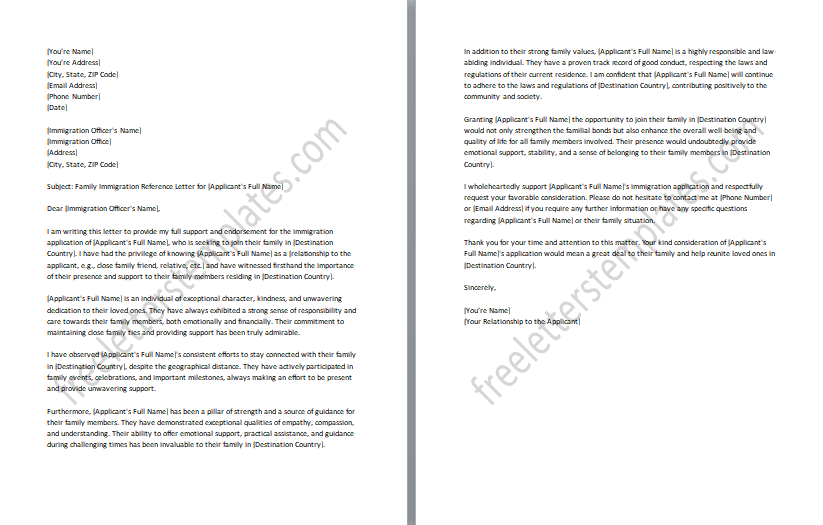
#5: Volunteer Immigration
A Volunteer Immigration Reference Letter is a document that attests to an individual’s dedication, commitment, and contributions as a volunteer, typically provided by a supervisor or organization they have volunteered with. This letter plays a crucial role in supporting an immigration application for individuals seeking to engage in volunteer work in a foreign country. The letter highlights the applicant’s volunteer activities, roles, responsibilities, and the positive impact they have made on the community or organization they have served. It provides strong evidence of their suitability for engaging in volunteer work in the destination country, increasing their chances of obtaining the desired immigration status.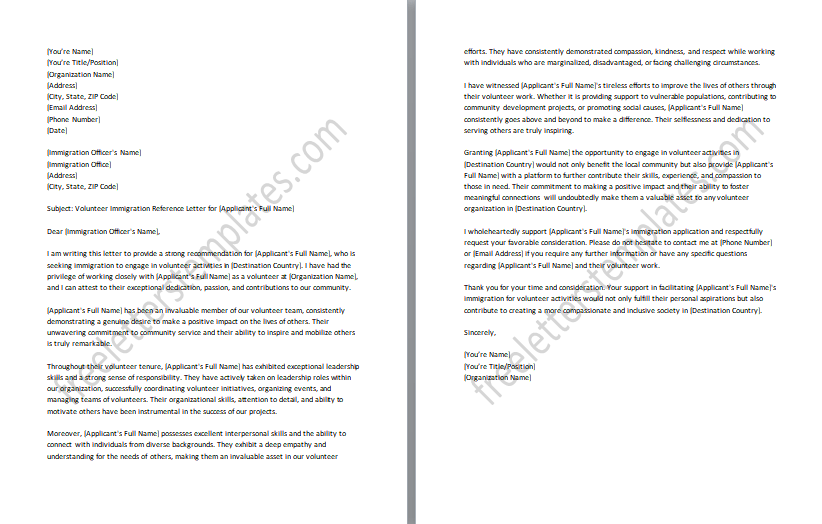
#6: Community Service Immigration
A Community Service Immigration Reference Letter is a testimonial provided by an individual or organization that has observed an applicant’s involvement in community service activities. This letter serves as a critical component of an immigration application for individuals seeking to engage in community service or contribute to the betterment of a foreign community. The letter highlights the applicant’s active participation, dedication, and impact in various community service initiatives. It emphasizes their commitment to social causes, leadership skills, and ability to collaborate with diverse groups of people. The Community Service Immigration Reference Letter underscores the applicant’s genuine concern for the well-being of others and their eagerness to make a positive difference in society.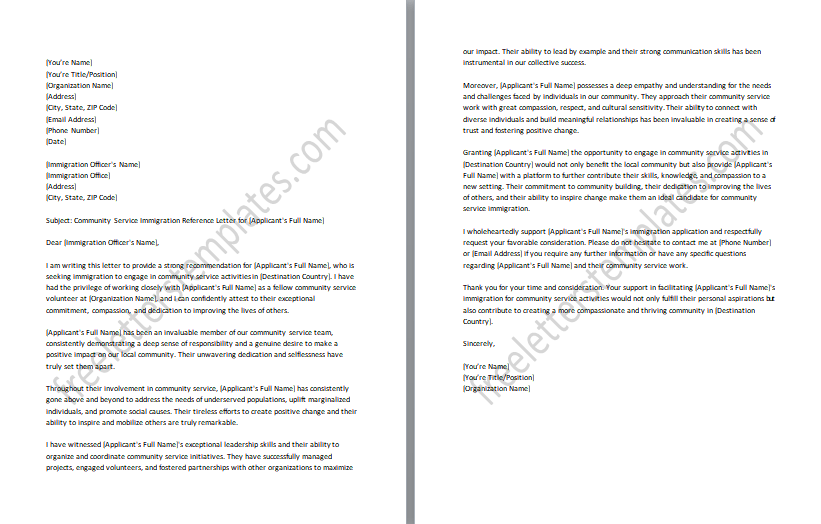
#7: Medical Immigration
A Medical Immigration Reference Letter is a professional document validating an individual’s medical qualifications, expertise, and experience, typically written by a colleague or supervisor. It supports immigration applications for individuals seeking to practice medicine or pursue medical opportunities abroad. The letter highlights the applicant’s medical education, specialized training, clinical skills, and professional accomplishments. It provides insights into their clinical competence, patient care abilities, and commitment to maintaining high ethical standards. This reference letter serves as a strong endorsement of the applicant’s medical expertise and suitability for the medical profession in the destination country, increasing their credibility and chances of obtaining the desired immigration status.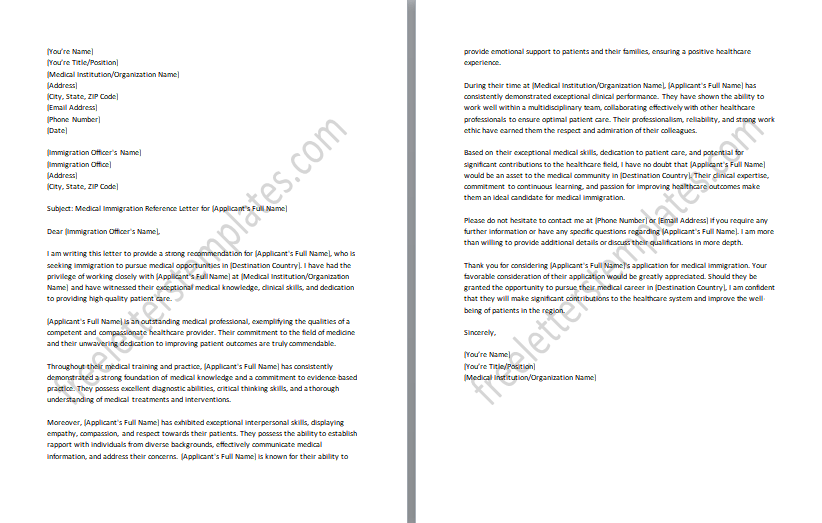
#8: Research Immigration
A Research Immigration Reference Letter is a document that validates an individual’s research skills, expertise, and contributions, typically written by a research supervisor, mentor, or collaborator. This letter plays a crucial role in supporting an immigration application for individuals seeking to engage in research or pursue academic opportunities in a foreign country. The letter highlights the applicant’s research background, academic achievements, publications, and their impact in the field. It emphasizes their analytical abilities, problem-solving skills, and dedication to advancing knowledge through rigorous research.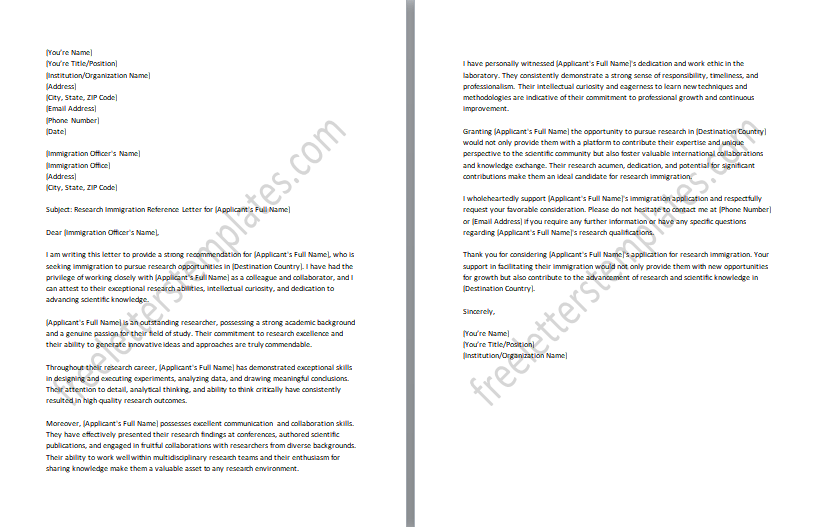
#9: Arts and Culture Immigration
An Arts and Culture Immigration Reference Letter is a document that validates an individual’s artistic talents, achievements, and cultural contributions, typically written by a mentor, curator, or fellow artist. This letter plays a vital role in supporting an immigration application for individuals seeking to engage in arts and cultural activities in a foreign country. The letter highlights the applicant’s artistic background, creative accomplishments, exhibitions, performances, and impact on the artistic community. It emphasizes their artistic vision, innovation, and dedication to preserving and promoting cultural heritage.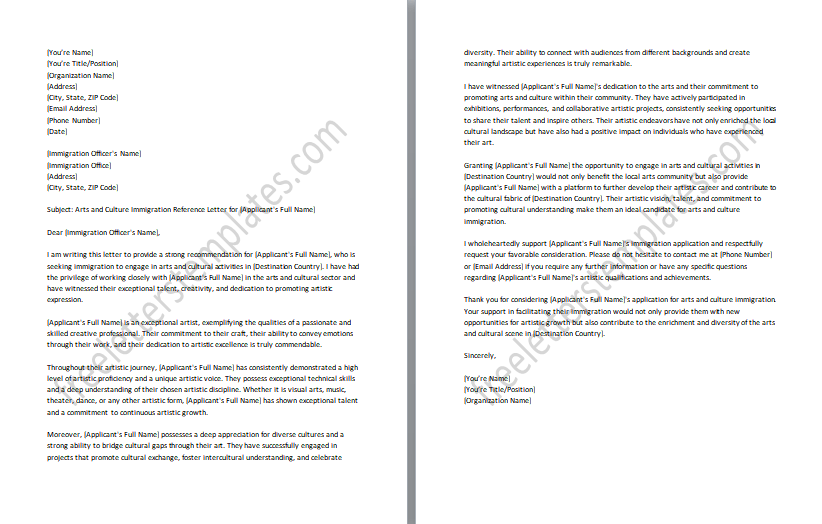
#10: Sports Immigration
A sports immigration reference letter serves as a vital document in the immigration process for athletes and sports professionals seeking to relocate to another country. This letter is typically written by a coach, team manager, or sports organization representative who has worked closely with the individual. It aims to support the individual’s visa application by highlighting their exceptional talent, professional experience, and the positive impact they can have on the local sports scene. The letter serves as a strong endorsement and validation of the athlete’s abilities, further strengthening their case for immigration.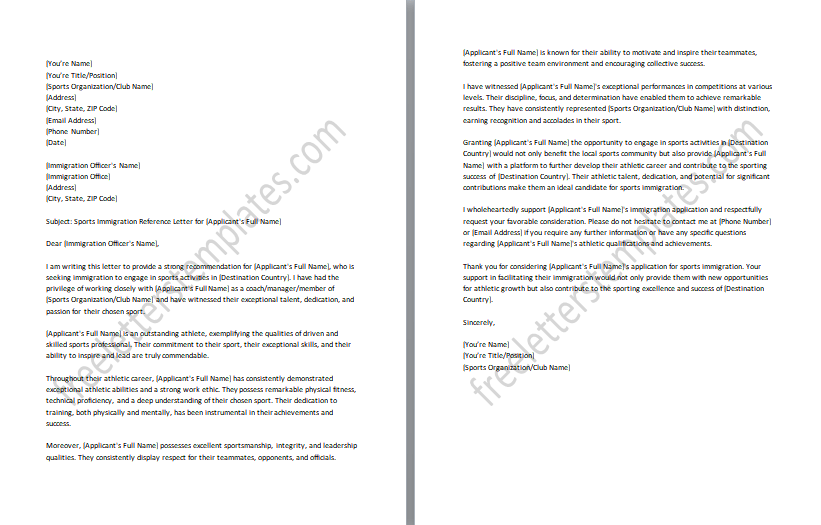
#11: Religious Immigration
A religious immigration reference letter plays a vital role in helping individuals who are seeking to relocate to another country for religious reasons. The main purpose of this letter is to provide a heartfelt account of the person’s religious activities, their contributions to the community, and their significance within the religious organization. It aims to showcase the individual’s unwavering dedication to their faith, their admirable moral character, and the positive impact they can have on the religious community in the new country. Essentially, the letter serves as a powerful endorsement of the person’s religious beliefs and practices, serving as a supportive validation for their immigration application.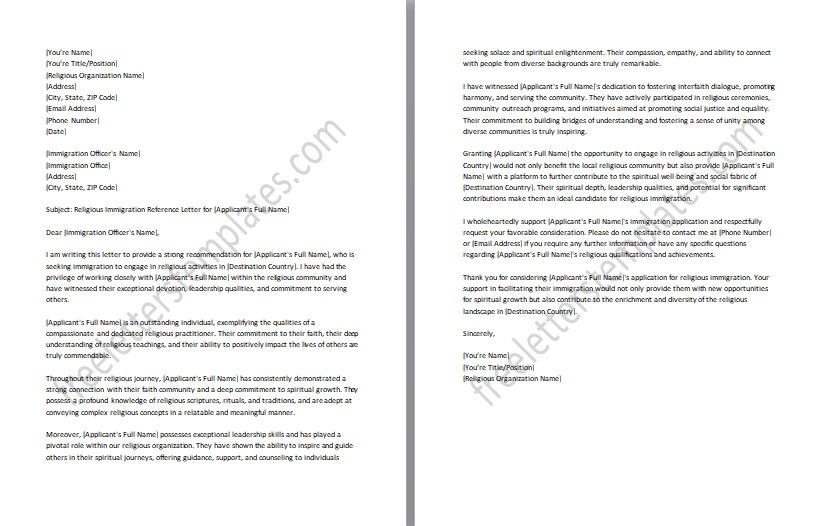
#12: Educational Immigration
An educational immigration reference letter is a crucial document supporting individuals seeking to relocate for educational purposes. It is typically written by a teacher, professor, or academic advisor who has closely worked with the individual. This letter highlights the person’s academic achievements, intellectual abilities, and potential contributions to the destination country’s educational community. It showcases their dedication to learning, academic prowess, and positive impact on the academic environment. The letter serves as a strong endorsement, emphasizing their educational goals and aspirations, and strengthening their immigration case. Ultimately, it demonstrates their potential to excel academically and make valuable contributions to the educational landscape of the new country.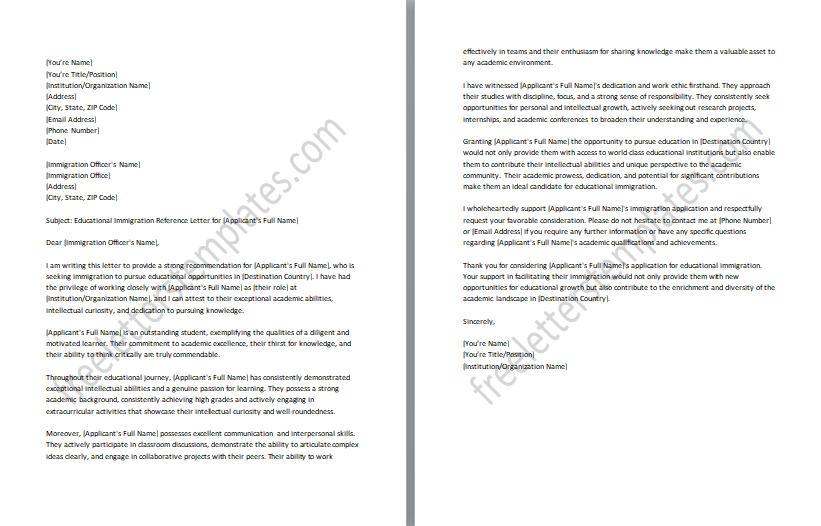
#13: Legal Immigration
A legal immigration reference letter is a crucial document that supports individuals seeking to immigrate to another country for legal purposes, such as work or family reunification. This letter is typically written by a lawyer, employer, or a trusted individual who can attest to the person’s character and eligibility for immigration. It aims to demonstrate that the person meets the legal requirements for immigration, possesses good moral character, and poses no threat to the receiving country. The letter serves as a strong endorsement, affirming the individual’s suitability for legal immigration and supporting their application process.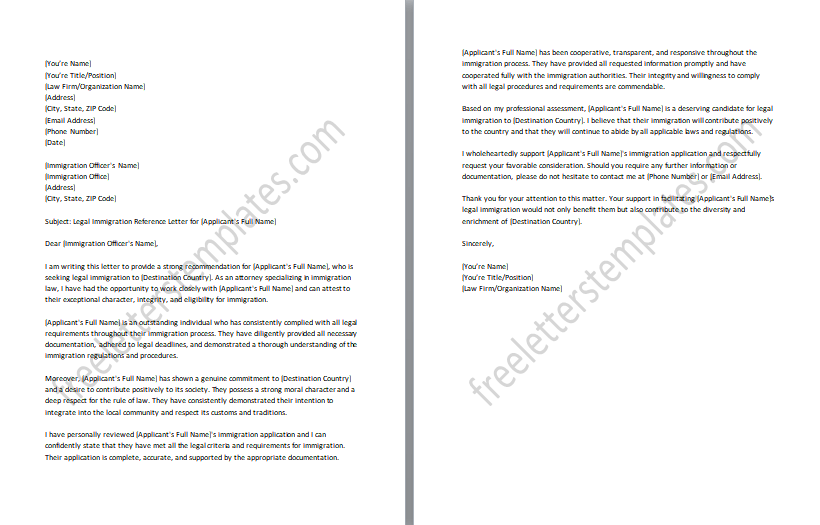
#14: Political Asylum Immigration
A political asylum immigration reference letter is a crucial document that supports individuals seeking political asylum in another country due to fear of persecution or harm in their home country. This letter is typically written by a lawyer, human rights advocate, or a trusted individual who is familiar with the person’s circumstances. It aims to demonstrate the person’s credibility, the validity of their claims, and their eligibility for asylum based on internationally recognized legal standards. The letter serves as a strong endorsement, advocating for the person’s right to seek refuge and supporting their application for political asylum.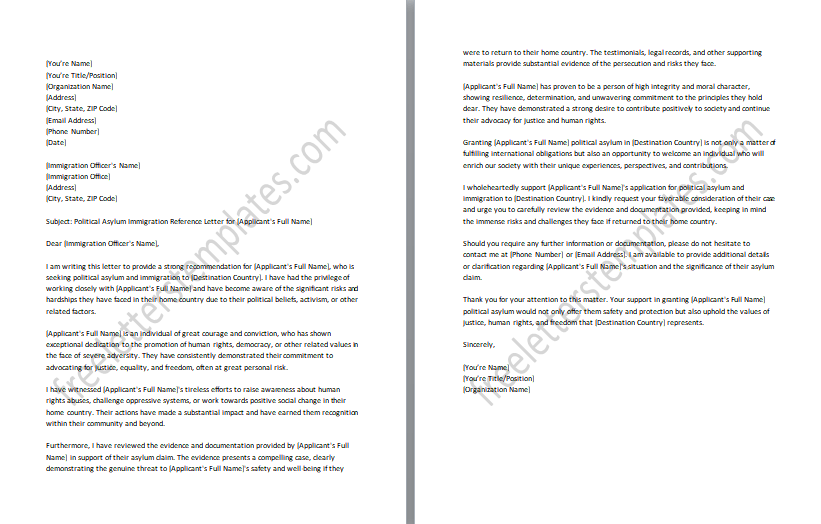
#15: Military Immigration
A military immigration reference letter is a vital document that supports individuals seeking to immigrate to another country based on their military service or affiliation. This letter is typically written by a commanding officer, military supervisor, or a representative from the military organization with which the individual has served. It aims to highlight their professionalism, leadership qualities, discipline, and dedication to service. The letter serves as a strong endorsement of the individual’s military background, emphasizing their value and potential contributions to the receiving country’s military or defense sector. It supports their immigration application by showcasing their unique qualifications and suitability for military immigration.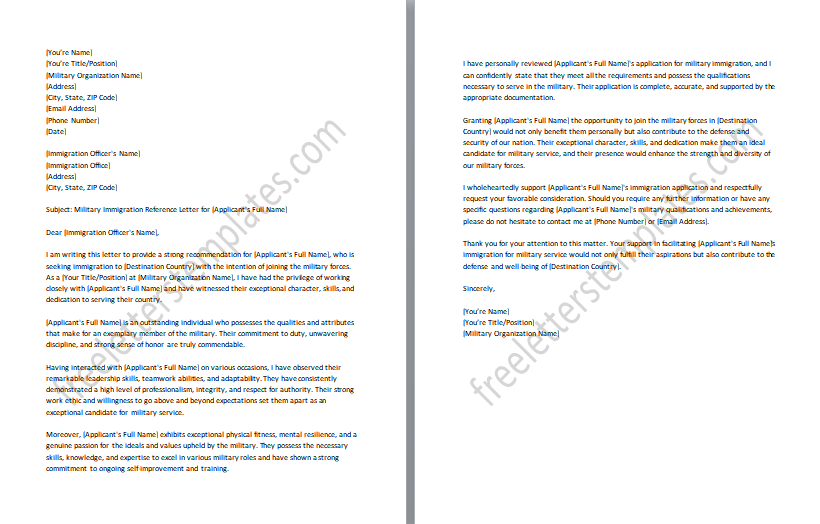
#16: Government Immigration
A government immigration reference letter is a significant document that supports individuals seeking to immigrate to another country for government-related purposes, such as employment in the public sector or diplomatic assignments. This letter is typically written by a government official, supervisor, or representative from a governmental organization who has worked closely with the individual. It aims to highlight their experience, integrity, leadership abilities, and their potential to make valuable contributions to the receiving country’s government or public administration. The letter serves as a strong endorsement of the individual’s suitability for government immigration, further supporting their application process.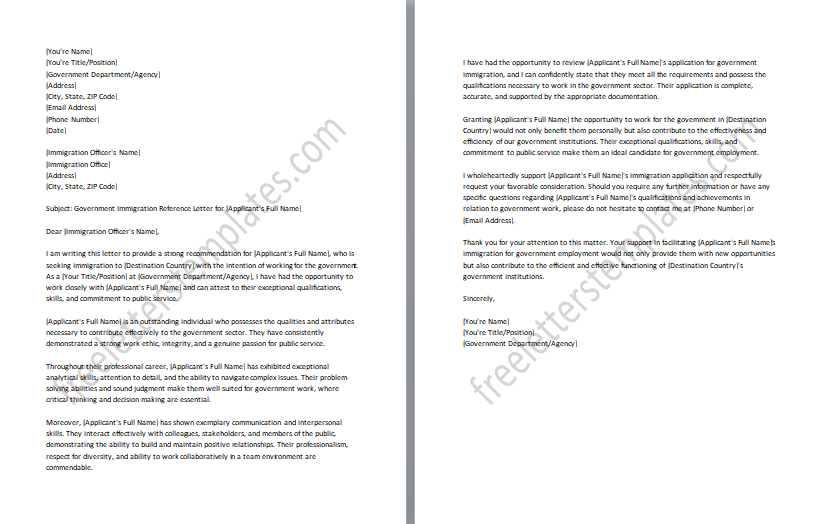
#17: Language Proficiency Immigration
A language proficiency immigration reference letter is a crucial document that supports individuals seeking to immigrate to another country based on their language skills and proficiency. This letter is typically written by a language teacher, language school representative, or a language assessment expert who has evaluated the individual’s language abilities. It aims to showcase the individual’s ability to communicate effectively in the language, which is essential for successful integration and participation in the new country. The letter serves as a strong endorsement of the person’s language proficiency, supporting their immigration application by demonstrating their readiness to navigate and contribute to the linguistic and cultural landscape of the receiving country.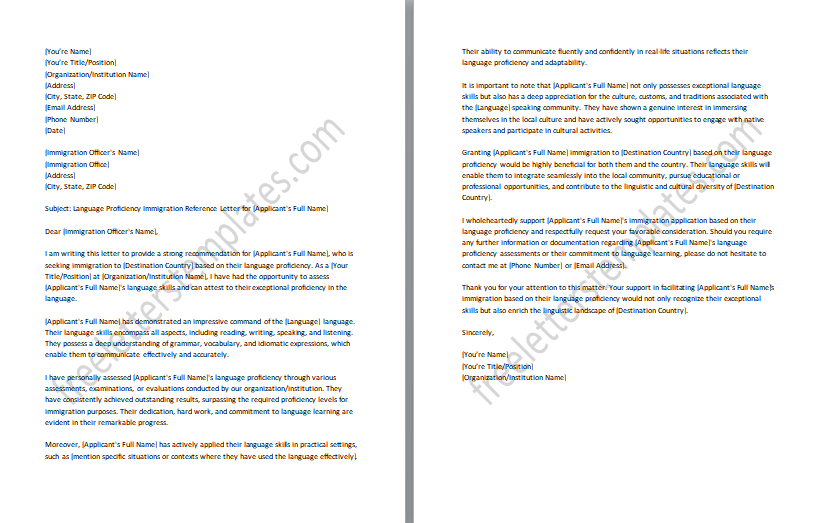
#18: Entrepreneurship Immigration
An entrepreneurship immigration reference letter is a crucial document that supports individuals seeking to immigrate to another country based on their entrepreneurial endeavors and potential contributions to the local economy. This letter is typically written by a business partner, investor, mentor, or representative from an entrepreneurial organization who has worked closely with the individual. It aims to highlight their innovative ideas, business success, and their ability to contribute to the local business community. The letter serves as a strong endorsement of the individual’s entrepreneurial capabilities, further bolstering their case for immigration as a valuable asset to the receiving country’s economy.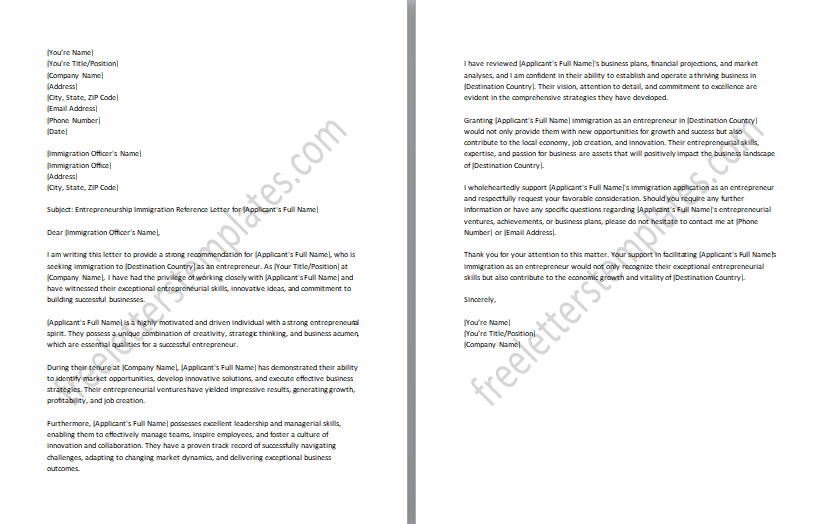
#19: Social Work Immigration
A social work immigration reference letter is a crucial document supporting individuals seeking immigration based on their qualifications and experience in social work. Typically written by a supervisor, colleague, or representative from a social work organization, this letter highlights the person’s professional skills, dedication to helping others, and potential contributions to the destination country’s social work sector. It emphasizes their expertise in areas like counseling, community outreach, advocacy, and case management. The letter serves as a strong endorsement, showcasing the individual’s abilities and passion for social work. It further supports their immigration application by demonstrating their readiness to positively impact the lives of individuals and communities in the new country.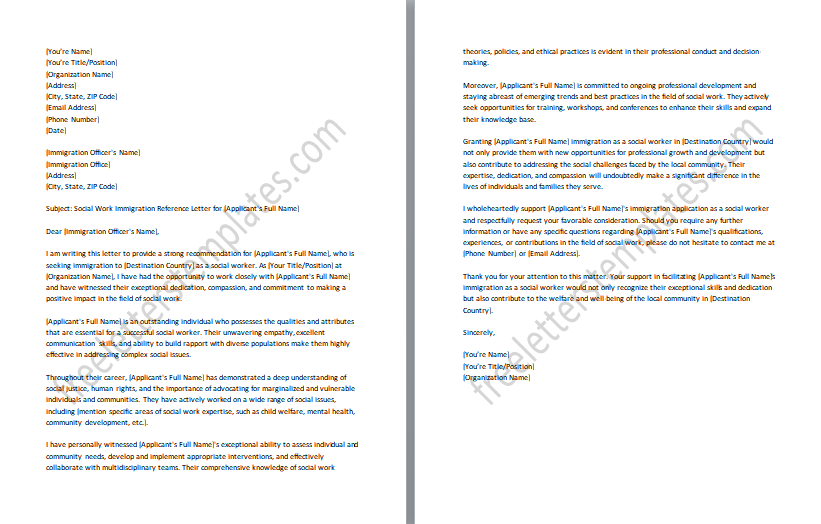
#20: Technology and Innovation Immigration
A technology and innovation immigration reference letter is a crucial document supporting individuals seeking immigration based on their expertise and contributions in the field of technology. Typically written by a supervisor, colleague, or representative from a technology-focused organization, this letter highlights the person’s technical skills, problem-solving abilities, creativity, and potential to drive technological advancements in the destination country. It showcases their track record of innovation, notable projects, and contributions to the technology industry. The letter serves as a strong endorsement, emphasizing the individual’s capabilities and potential to positively impact the technological landscape. It further supports their immigration application by showcasing their readiness to contribute to the growth and development of the receiving country’s innovation ecosystem.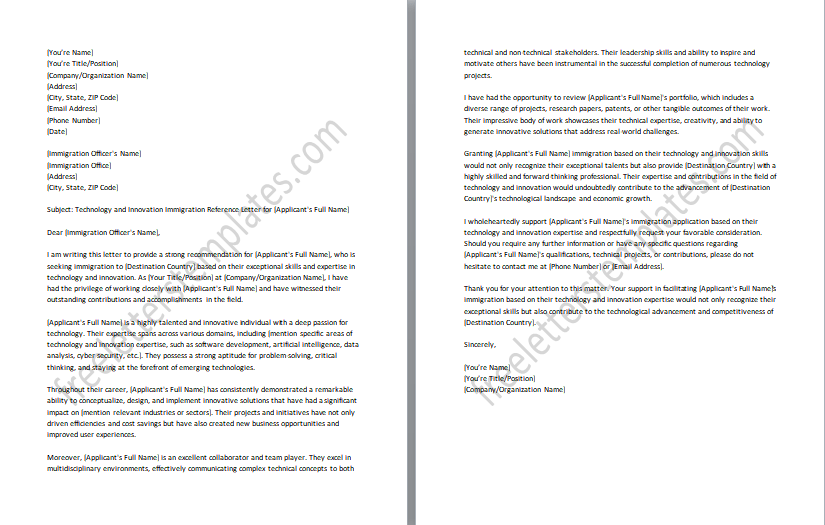
#21: Teaching Immigration
A teaching immigration reference letter is a vital document supporting individuals seeking to immigrate to another country based on their qualifications and experience in the field of education. This letter is typically written by a principal, supervisor, or colleague who has closely observed the individual’s teaching abilities. It aims to highlight their expertise in curriculum development, classroom management, and their ability to foster a positive learning environment. The letter serves as a strong endorsement of the individual’s teaching capabilities, further supporting their immigration application by demonstrating their readiness to make a positive impact on the lives of students and the education community in the receiving country.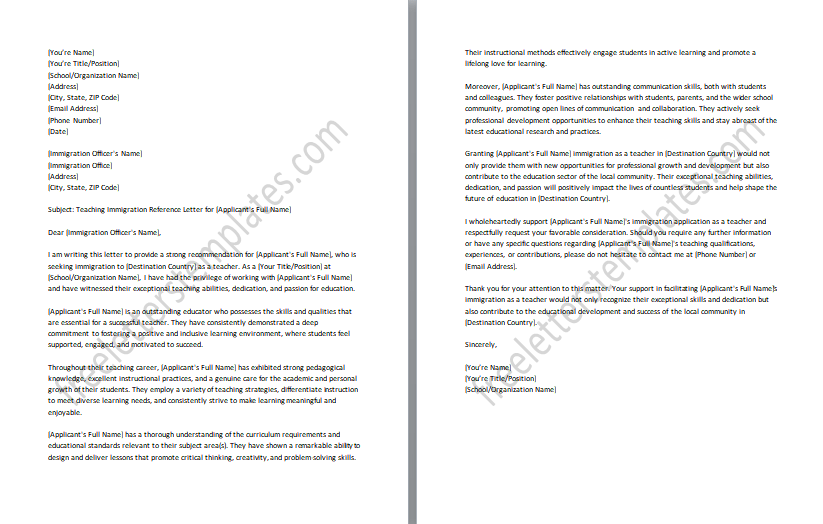
#22: Scientific Collaboration Immigration
A scientific collaboration immigration reference letter is a crucial document supporting individuals seeking immigration based on their expertise and potential for scientific collaboration in another country. Typically written by a colleague, supervisor, or a representative from a scientific institution, this letter highlights the person’s scientific accomplishments, research skills, and ability to collaborate effectively with others. It emphasizes their contributions to the field, including publications, grants, and partnerships. It supports their immigration application by demonstrating their readiness to engage in fruitful collaborations and enhance the scientific community in their new environment.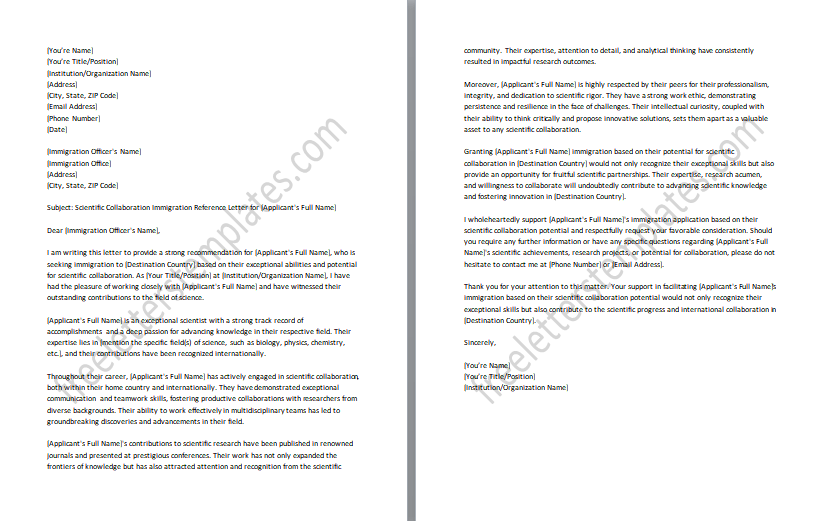
#23: NGO/Nonprofit Immigration
An NGO/nonprofit immigration reference letter is a crucial document supporting individuals seeking immigration based on their involvement and contributions to nonprofit organizations. Typically written by a supervisor, colleague, or representative from the NGO/nonprofit sector, this letter highlights the person’s dedication to social causes, their impact on the community, and their potential contributions to the receiving country’s nonprofit sector. It emphasizes their skills in program management, community engagement, fundraising, and advocacy. It supports their immigration application by demonstrating their ability to make a positive impact and further the mission of nonprofit organizations in their new environment.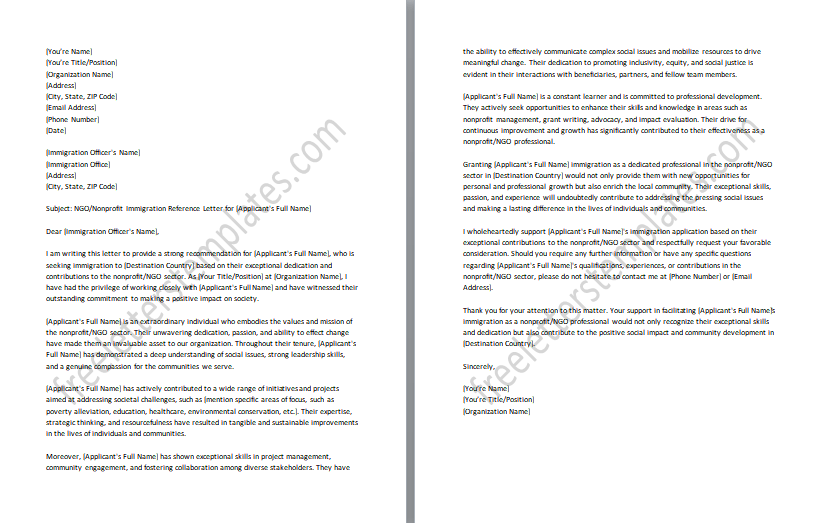
#24: Engineering Immigration
An engineering immigration reference letter is a crucial document that supports individuals seeking immigration based on their qualifications and expertise in the field of engineering. Typically written by a supervisor, colleague, or representative from an engineering organization, this letter highlights the person’s technical skills, problem-solving abilities, and potential contributions to the engineering industry in the destination country. It emphasizes their experience in specific engineering disciplines, project management, and their track record of successful projects. It supports their immigration application by demonstrating their value as a skilled engineer and their potential to positively impact the engineering community in their new environment.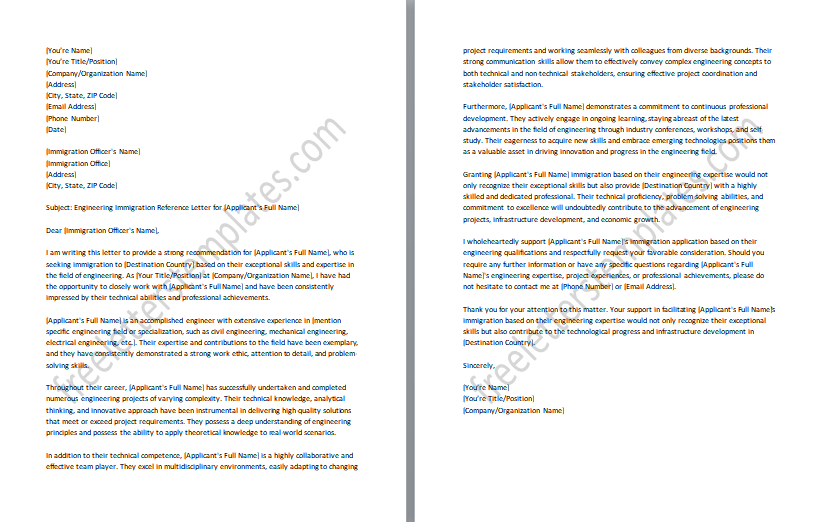
#25: Judicial Immigration
A judicial immigration reference letter is a crucial document that supports individuals seeking immigration based on their qualifications and expertise in the field of law and judiciary. Typically written by a senior judge, legal colleague, or a representative from the legal profession, this letter highlights the person’s legal knowledge, professionalism, and potential contributions to the judicial system in the destination country. It emphasizes their experience in legal practice, courtroom skills, and their reputation for fairness and impartiality. The letter serves as a strong endorsement, showcasing the individual’s capabilities and readiness to uphold the principles of justice in their new environment. It supports their immigration application by demonstrating their value as a skilled judicial professional and their potential to contribute to the legal and judicial community in the receiving country.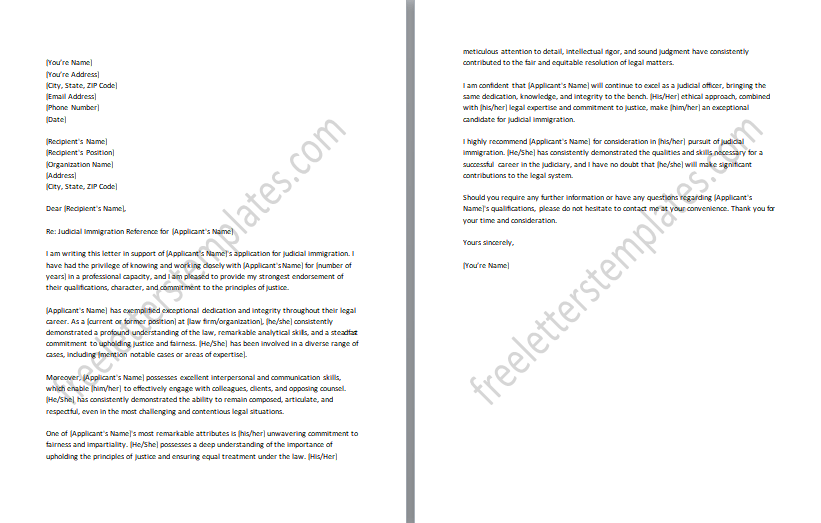
Effective Immigration Writing Guides
- Introduction:
- Start with a formal salutation addressing the recipient.
- Introduce yourself and your role or position that qualifies you to write the reference letter.
- State your relationship with the applicant and how long you have known them.
- Structure:
- Organize the letter into paragraphs, each focusing on a specific aspect of the applicant’s qualifications.
- Use headings or subheadings to clearly delineate different sections.
- Content:
- Provide a brief overview of the applicant’s background, including their education, work experience, and relevant accomplishments.
- Highlight specific skills, knowledge, or expertise that are relevant to their immigration application.
- Include examples or anecdotes that demonstrate the applicant’s abilities and achievements.
- Discuss any notable contributions the applicant has made in their field or community.
- Tone:
- Maintain a professional and objective tone throughout the letter.
- Use positive language to convey your assessment of the applicant’s qualifications.
- Avoid overly emotional or exaggerated statements.
- Supporting Evidence:
- Back your statements with specific examples, data, or measurable outcomes whenever possible.
- Reference any relevant awards, publications, or notable projects the applicant has been involved in.
- Addressing Selection Criteria:
- Familiarize yourself with the specific immigration requirements or selection criteria relevant to the applicant’s application.
- Clearly address how the applicant meets or exceeds these criteria in your letter.
- Conclusion:
- Summarize the applicant’s key qualifications and strengths.
- Express your confidence in the applicant’s abilities to succeed in their chosen immigration pathway.
- Offer your contact information in case further clarification or verification is needed.
- Proofreading:
- Carefully proofread the letter for grammar, spelling, and punctuation errors.
- Check for clarity and coherence in your writing.
- Ensure the letter reads smoothly and is free from any typos or inconsistencies.
Understanding Immigration Requirements:
Immigrating to a new country involves navigating specific immigration categories, each with its own set of requirements. Here is an overview of different immigration categories and how reference letters can help meet these requirements and support an individual’s eligibility for immigration:
- Employment-Based Immigration:
- Many countries offer immigration pathways for skilled workers or professionals in high-demand fields.
- Reference letters can help demonstrate the applicant’s relevant work experience, skills, and qualifications in their field.
- The letters can highlight the applicant’s achievements, professional growth, and contributions to their previous employers or projects.
- Family-Based Immigration:
- Family-sponsored immigration allows individuals to join their close family members who are already residents or citizens of the destination country.
- Reference letters from family members or relatives can help establish the genuine nature of the relationship and support the sponsorship.
- These letters can provide insights into the nature of the relationship, the duration of the relationship, and the support the applicant would receive from their family.
- Entrepreneurship and Investment Immigration:
- Some countries offer immigration pathways for entrepreneurs and investors who can contribute to the economy.
- Reference letters from business partners, clients, or investors can attest to the applicant’s entrepreneurial skills, track record, and potential contributions.
- These letters can showcase the applicant’s ability to create jobs, drive innovation, or make significant investments in the destination country.
- Humanitarian or Asylum-Based Immigration:
- Individuals seeking asylum or fleeing persecution in their home countries may apply for humanitarian or asylum-based immigration.
- Reference letters from individuals or organizations familiar with the applicant’s circumstances can support their claims for asylum or humanitarian protection.
- These letters can provide information on the applicant’s personal story, the reasons for seeking refuge, and the potential risks they face if they return to their home country.
- Student-Based Immigration:
- Many countries welcome international students to pursue higher education.
- Reference letters from teachers, professors, or academic advisors can testify to the applicant’s academic achievements, intellectual potential, and commitment to their field of study.
- These letters can highlight the applicant’s academic skills, research capabilities, and their potential to contribute to the academic community.
Concluding Thoughts
In conclusion, immigration reference letters are instrumental in supporting individuals’ eligibility for immigration by providing valuable insights into their qualifications, skills, relationships, and personal circumstances. Understanding the specific requirements of different immigration categories allows us to tailor these letters to effectively address the criteria set by immigration authorities. Whether it is showcasing an applicant’s professional achievements, familial ties, entrepreneurial endeavors, humanitarian needs, or academic potential, reference letters offer a comprehensive perspective on an individual’s suitability for immigration. By highlighting the applicant’s strengths and demonstrating their ability to contribute positively to the destination country, these letters play a pivotal role in strengthening immigration applications. We recognize the significance of well-crafted reference letters and are committed to assisting individuals in presenting their qualifications and aspirations in the most compelling and persuasive manner.
← Previous Article
« The Reference Letter Vault: Empowering Volunteers with 20 Persuasive Templates